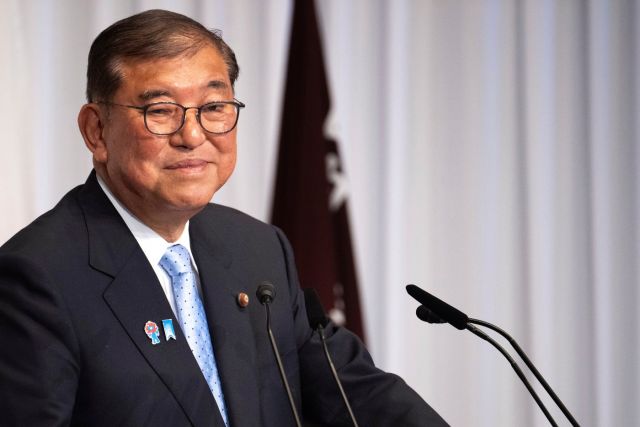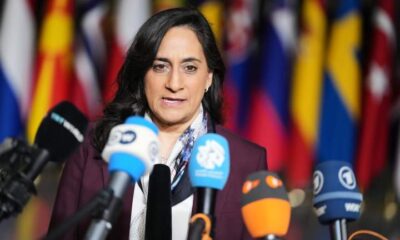World
Ishiba Remains as Japan’s PM Despite Election Setback

Japanese Prime Minister Shigeru Ishiba announced on Monday that he will continue to serve despite his ruling coalition losing its majority in both houses of the National Diet during the recent elections. The Liberal Democratic Party (LDP) and its junior coalition partner, Komeito, fell short by three seats in the 248-seat upper house, leading to calls for Ishiba’s resignation.
The election results have left the coalition in a minority position, prompting Ishiba to focus on pressing challenges such as rising prices and ongoing tariff negotiations with the United States. He expressed a commitment to avoiding a political vacuum, stating, “While I painfully feel my serious responsibility over the election results, I believe I must also fulfill my responsibility I bear for the country and the people so as not to cause politics to stall or go adrift.”
Ishiba emphasized the importance of addressing issues that cannot wait, including the upcoming August 1, 2023, deadline for a tariff deal with the U.S. His chief tariff negotiator, Ryosei Akazawa, is preparing for the eighth round of discussions in Washington. Ishiba aims to secure a mutually beneficial agreement and hopes to meet with U.S. President in the near future.
The election outcome reflects significant discontent among voters, largely attributed to past corruption scandals and dissatisfaction with Ishiba’s administration. This sentiment has enabled rising conservative and right-wing populist parties to gain traction, with the Democratic Party for the People quadrupling its parliamentary seats by advocating for increased take-home pay. Meanwhile, the right-wing Sanseito, promoting a “Japanese First” agenda, has emerged as a significant player in the opposition.
In light of the election results, Ishiba acknowledged the need for introspection. “I will quickly analyze the results and learn the lesson,” he remarked during a press conference. Despite calls for his resignation, he made it clear that he intends to remain in office to address the pressing issues facing the nation, asserting that his commitment is to the public rather than personal interests.
Opposition parties have largely rejected the idea of cooperating with the ruling coalition. Yoshihiko Noda, leader of the Constitutional Democratic Party of Japan (CDPJ), stated that his priority is to form a coalition among opposition parties, claiming public sentiment has turned against Ishiba’s government. Conversely, Sohei Kamiya, leader of the Sanseito, expressed willingness to collaborate on conservative policies, although he indicated his party aims to gain more seats in future elections.
As Ishiba navigates this challenging political landscape, he faces the dual task of addressing immediate economic concerns while trying to stabilize his administration amidst growing opposition. The coming weeks will be critical in determining both the direction of Japan’s domestic policy and the stability of Ishiba’s leadership.
-

 Politics4 weeks ago
Politics4 weeks agoSecwepemc First Nation Seeks Aboriginal Title Over Kamloops Area
-

 World5 months ago
World5 months agoScientists Unearth Ancient Antarctic Ice to Unlock Climate Secrets
-

 Entertainment5 months ago
Entertainment5 months agoTrump and McCormick to Announce $70 Billion Energy Investments
-

 Science5 months ago
Science5 months agoFour Astronauts Return to Earth After International Space Station Mission
-

 Lifestyle5 months ago
Lifestyle5 months agoTransLink Launches Food Truck Program to Boost Revenue in Vancouver
-

 Technology3 months ago
Technology3 months agoApple Notes Enhances Functionality with Markdown Support in macOS 26
-

 Lifestyle3 months ago
Lifestyle3 months agoManitoba’s Burger Champion Shines Again Amid Dining Innovations
-

 Top Stories2 months ago
Top Stories2 months agoUrgent Update: Fatal Crash on Highway 99 Claims Life of Pitt Meadows Man
-

 Politics4 months ago
Politics4 months agoUkrainian Tennis Star Elina Svitolina Faces Death Threats Online
-

 Sports5 months ago
Sports5 months agoSearch Underway for Missing Hunter Amid Hokkaido Bear Emergency
-

 Politics5 months ago
Politics5 months agoCarney Engages First Nations Leaders at Development Law Summit
-

 Technology5 months ago
Technology5 months agoFrosthaven Launches Early Access on July 31, 2025





















